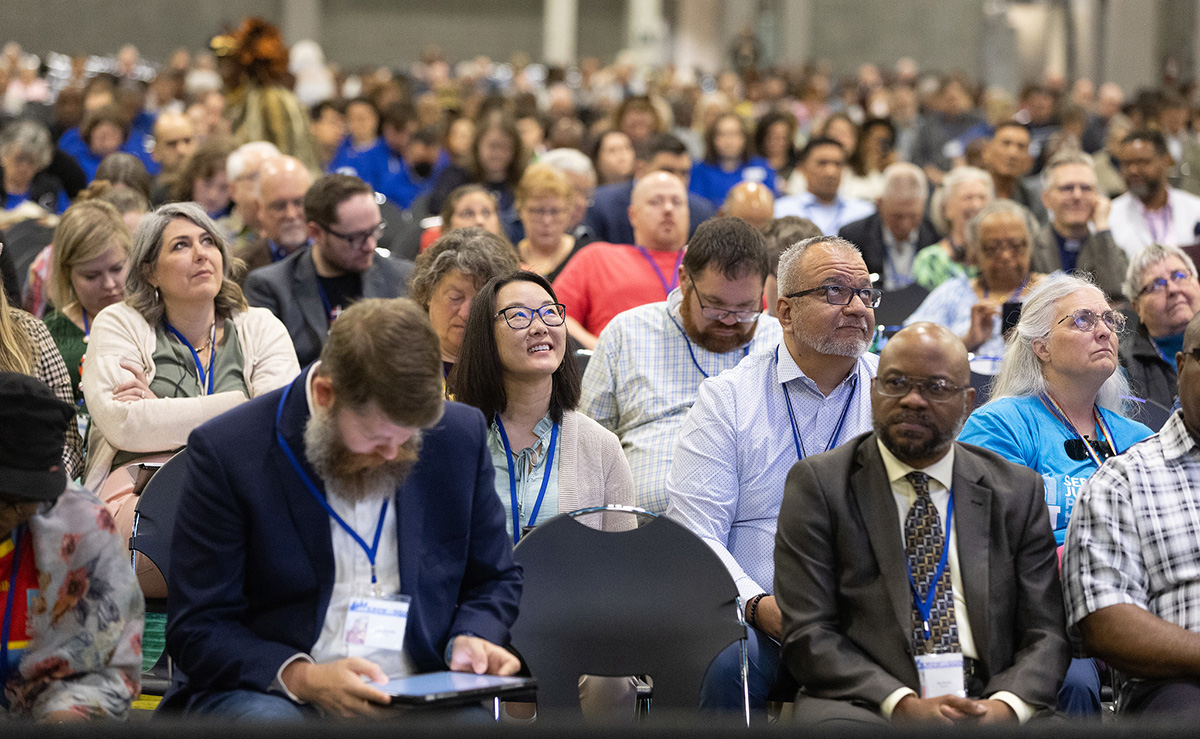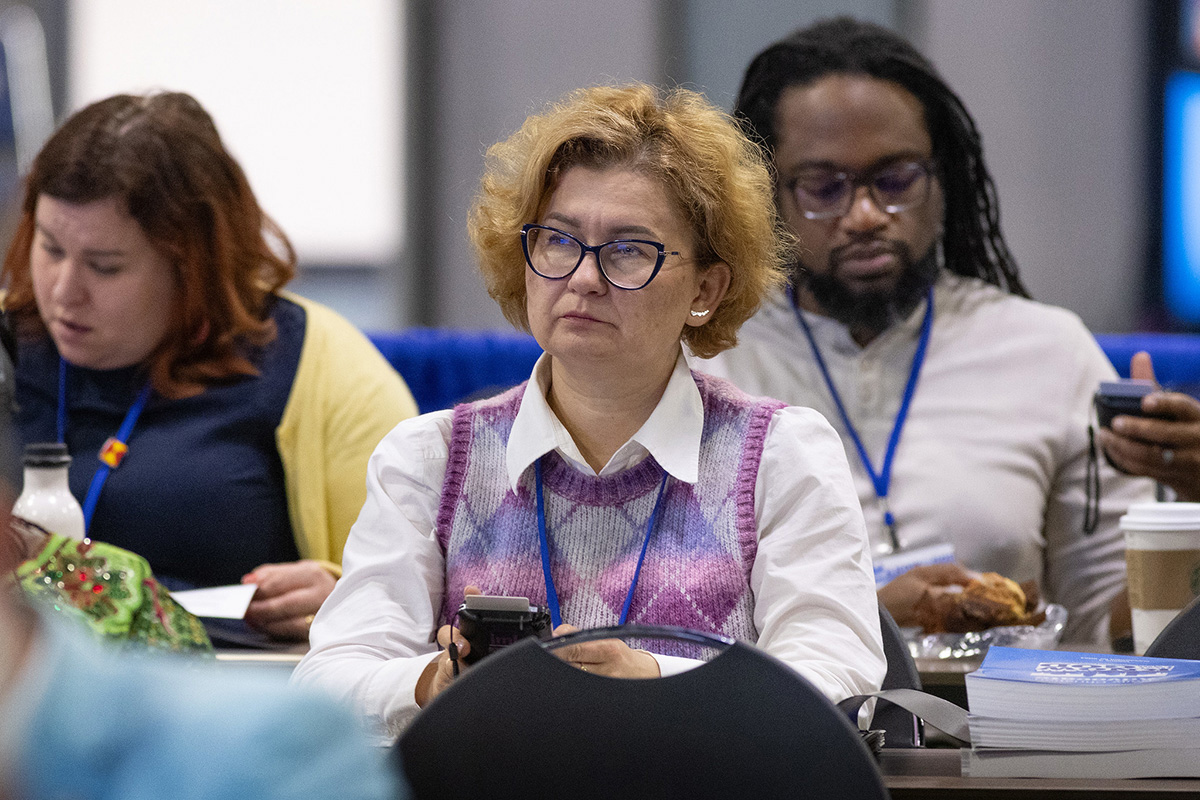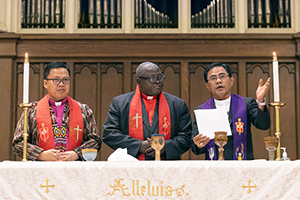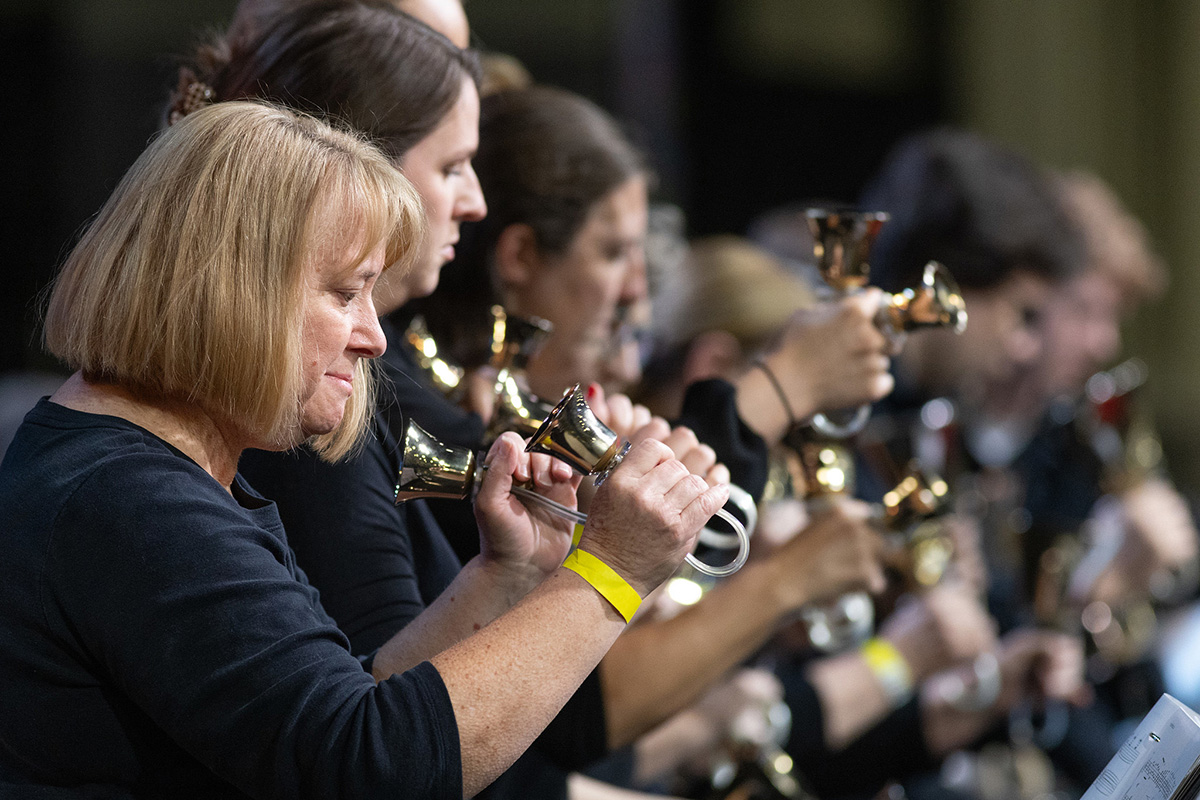The first week of General Conference wrapped up with the passage of the first of a number of proposed revisions to the United Methodist Social Principles. Delegates will work late to complete their legislative committee work, which they must finish today to begin voting next week.
Tomorrow brings a much-needed day of Sabbath to refresh spiritually, mentally and physically.
Church broadens defense of human rights
The United Methodist Church now proclaims its support “for the equal rights, liberties, and protections of all people, regardless of sexual orientation or gender identity.”
Subscribe to our
e-newsletter
During the morning plenary, General Conference delegates approved that statement as part of the first batch of revised Social Principles to come before the body.
General Conference passed revised Social Principles dealing with “Church and Governments” and “Basic Rights and Freedoms” — alongside nine other pieces of legislation — on the consent calendar. The vote tally was 671 to 57, passing with 92% of the vote.
The United Methodist Church and its predecessors have long taken public stands on issues of the world going back to the 1908 Social Creed, which called for “equal rights and complete justice for all men in all stations of life.”
But this marks the first time that the denomination is calling for human rights no matter a person’s gender identity. By that, the Social Principle means people should be treated with basic human dignity regardless of whether they are male, female, intersexual, transgender or nonbinary.
Other revisions passed in the first batch of proposals speak out against slavery, torture, genocide and war crimes; reaffirm the denomination’s opposition to the death penalty, affirm health care as a basic human right and support the rights of Indigenous, native and Aboriginal communities, migrants, immigrants and refugees, including displaced and stateless people.
More Revised Social Principles — including ones dealing with the church’s teachings on creation care, human sexuality and marriage — will come before General Conference delegates for a vote next week.

Connectional Table becomes more global
Also on this morning’s consent calendar, General Conference delegates approved the restructuring of the Connectional Table so the United Methodist leadership body has a more international membership.
The Connectional Table coordinates the denomination’s mission, ministry and resources, including the work of the denomination’s general agencies. The leadership body also has a hand in developing the denomination-wide budget that goes before General Conference for a final vote.
Under the plan approved by General Conference, Connectional Table goes from a 64-member board with 49 voting members to a 60-member board with 44 voting members.
Voting members will now include six bishops, a youth or young adult from the Division on Ministries with Young People, five representatives of racial-ethnic caucuses and five members each from Africa, Asia, Europe and North America.
The five members from each continent must include two clergy and three laity, with at least one female layperson, one female clergy, and one person under the age of 26 at the time of election.
Also among the voting members will be the presidents of 10 general agencies and two other denomination-wide bodies.
Bishop: Stop quarreling, count your blessings

Zimbabwean Bishop Eben K. Nhiwatiwa declared United Methodists have argued enough, should unite and start rejoicing as they have achievements to celebrate.
In his sermon during April 27 morning worship at General Conference, he told delegates, “Wherever you are, my friend, bring more people to Christ. It’s not about destroying one denomination to build another.”
Nhiwatiwa gave the example of the late U.S. missionary Dr. Samuel Guerney, who dug a well in the Murewa District of Zimbabwe in 1909. That water source still exists. “When people don’t know the beginnings of these institutions,” the bishop said, “they try to play with them.”
The bishop declared his love for The United Methodist Church. “I love the church,” he said, “not because I am a bishop, but I have loved it since I received Jesus Christ in 1964. It’s now 60 years. From my personal witness, there’s no other denomination which does ministry better or more than this denomination.”
More than voting is happening at General Conference

The Rev. Yulia Starodubets is representing the Ukraine-Moldova Provisional Conference at General Conference. She has felt the denomination’s support as she and colleagues carry on with mission work in the midst of war. She and her husband have joined other United Methodists in working with internally displaced persons since Russia’s invasion of Ukraine.
Nothing happens at this legislative assembly without a lot of prayer — before, during and after. For those needing a quiet place to pray during the long and often-emotional assembly, The Upper Room offers a welcoming space on the upper floor of the Charlotte Convention Center. The “Cultivating the Garden of the Heart” prayer room at E222 is open to all and includes prompts and Scriptures in Portuguese, Korean, French and Kiswahili.
Do you have trouble keeping track of whether delegates are debating a main motion, an amendment or, perhaps, the dreaded amendment to the amendment? Sometimes, so do the presiding bishops! When those bishops need a little advice, they can turn to Maurice S. Henderson, the General Conference parliamentarian.

General Conference photos
At General Conference, the Rev. Matt Rawle is both a Louisiana Conference delegate and a singer in the main band performing during morning worship. Rawle, pastor of Asbury United Methodist Church in Bossier City, Louisiana, often sings during his sermons. That was how he came to the attention of Raymond Trapp, who oversees music for General Conference. "Phenomenal" is how Trapp sums up Rawle's singing.
During General Conference, the Worldwide Craft Market is open at the Hilton Garden Inn, a block from the Charlotte Convention Center, every day except Sunday. All profits from the sale of wares from Africa, the Philippines and Palestine go back into the pockets of the individuals selling their goods to support various ministries. Many vendors are also central conference delegates whose schedules are filled with meetings, so a group of volunteers from the Love Your Neighbor Coalition and the United Women in Faith of the Western North Carolina Conference Metro District is overseeing the market for them, allowing them to focus on their delegate duties.
On the periphery of General Conference, groups are busy every day, trying to influence legislation and raise awareness about causes in which they believe passionately. Sam Hodges from UM News profiles a few of the groups and how they go about advocating for their cause.
The United Methodist commissions on the Status and Role of Women and Religion and Race appointed two monitors to sit in each legislative committee meeting to ensure women and ethnic minorities can express themselves freely as they help decide the future of The United Methodist Church. The monitors are introduced at the start of each meeting. Women are urged to report to them or the General Conference office if they feel harassed or disrespected.
In other news
The Love Your Neighbor Coalition sent a note of thanks to Bishop Thomas Bickerton after a yoga symbol considered offensive by a caucus of United Methodist Asian Americans was removed from the General Conference stage. The New Federation of Asian American United Methodists published an open letter to Bickerton on April 24 explaining that the symbol is offensive because it is used by the Hindu Nationalist government to persecute religious minorities such as Christians, Muslims and Sikhs.
Butler is a multimedia producer/editor for UM News. Contact him at newsdesk@umcom.org or 615-742-5470. UM News staff, Oregon-Idaho Conference communications manager Kristen Caldwell and Audrey Stanton-Smith, editor of United Women in Faith’s response magazine, contributed to this report.
To read more United Methodist news, subscribe to the free daily or weekly Digests.




